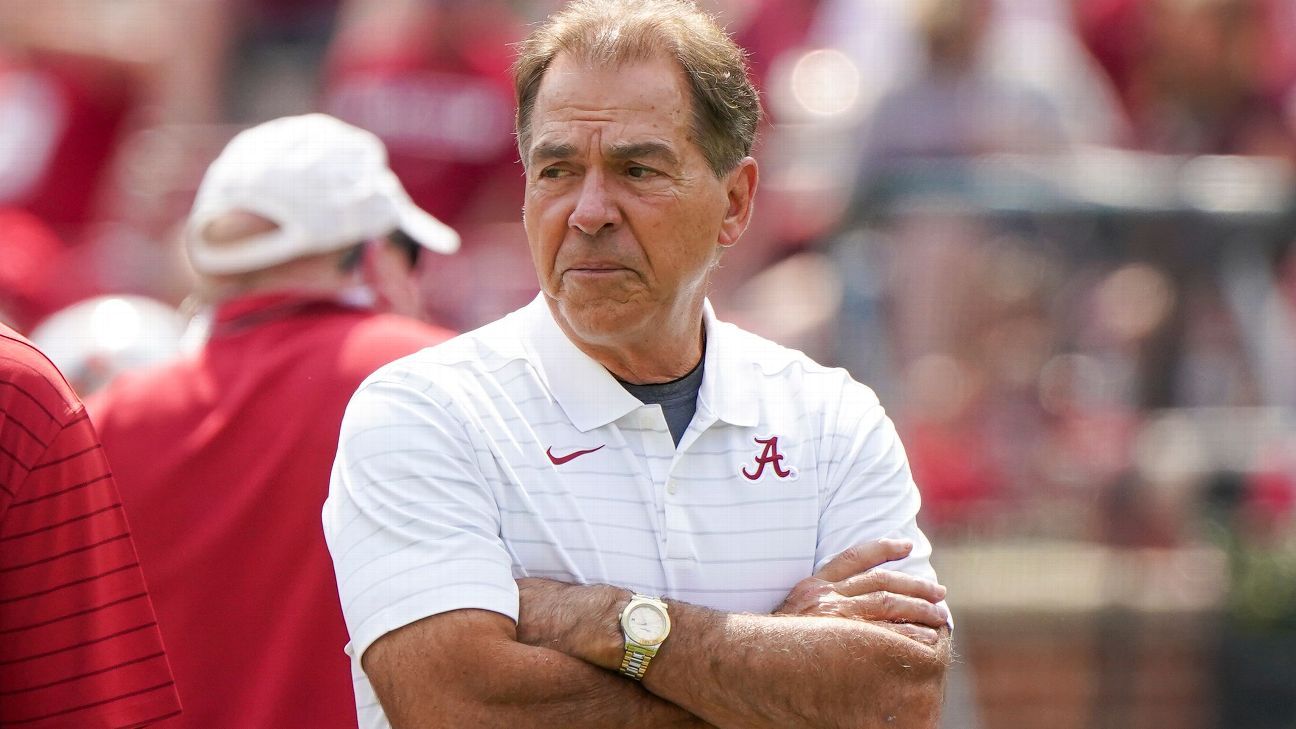TUSCALOOSA, Ala. — Nick Saban, while admitting he was wrong to “single out” Texas A&M and Jackson State in comments he made Wednesday concerning the implementation of name, image and likeness, told ESPN on Thursday he wasn’t backing down on his stance that paying high school players under the guise of NIL could potentially ruin college sports.
“It’s gotten completely out of control and not a sustainable model,” Saban said. “It’s to the point where you’ve got these attorneys/agents calling collectives and saying, ‘Pay my player a hundred thousand dollars a year,’ and then they want their piece of that. They all want a cut.”
Saban said he reached out to both Texas A&M’s Jimbo Fisher and Jackson State’s Deion Sanders wanting to apologize for bringing their specific schools into the conversation.
“I should have been more specific when I said ‘bought’ in saying you can buy players now through name, image and likeness and never mentioned any specific school and just said across the sport,” Saban said. “That’s on me. But other than that, I don’t have any regrets over what I said Wednesday [at the World Games in Birmingham speaking event].”
Saban said he’s not apologizing for speaking out and understands he’s going to be criticized.
“A lot of people are silent on this, and some of it has been people lumping NIL in with using NIL to pay players to go to school,” Saban said. “But, you know, at this stage of my career, I’m not worried about what people think of me.”
Saban, 70, has continually adapted and evolved during his coaching career. He’s never been a fan of up-tempo offenses, but retooled Alabama’s offense several years ago to take advantage of the current rules on offense. He’s also never completely embraced the transfer portal, but has used it effectively the last two years. Ohio State wide receiver transfer Jameson Williams was a huge part of the Tide’s SEC championship team last season, and Georgia Tech running back transfer Jahmyr Gibbs was one of the stars this spring.
Saban shrugged when asked how he would adapt to the current NIL rules.
“I don’t want to go down that road of bidding for players out of high school. I don’t,” Saban said. “But if we go through this recruiting class this year and we lose all the players, because they’re making a hundred thousand dollars going someplace else, then what can you do?
“The hard thing is there are no guardrails on this road. You can do whatever the hell you want, and in the end, most of this is not good for the players. You know, there are some terrible statistics out there about guys that transfer and how many of those guys graduate, terrible statistics on that. And we’re enticing a lot of that.”
Saban thinks there are three categories of schools capitalizing right now on the lack of structure surrounding NIL.
“First would be the people who are being aggressive in this to improve the program,” Saban said. “Then there are the people who don’t really want to do it, but are sort of getting roped into it because they don’t feel like they have a choice. And then there are the people who are trying to hold the line like we are and saying, ‘OK, we’re going to create equal opportunity for players, but we don’t want to get into any kind of bidding wars to get guys to come here for money.’ “
Saban has referred to parity in college sports several times in the last few weeks and clarified what he means by parity is that players get the same education, same health care and same university benefits. He said the same applies to NIL deals.
He said the goal at Alabama is to set up deals for all scholarship players to receive somewhere in the $20,000 to $25,000 range.
“That way, nobody feels that one player is getting a bunch of money to come here and another player feels like he’s not getting anything,” Saban explained. “Once they get here and earn it, like a Bryce Young, I’m for them getting everything they can. Then everybody can earn whatever they can earn.
“I want to create equal opportunity for every player.”
Saban’s concerns about the implementation of NIL echo what Clemson’s Dabo Swinney told ESPN last month. Dabo was especially outspoken about setting up NIL deals to entice high school prospects to sign with certain schools.
“There’s no rules, no guidance, no nothing,” Swinney said. “It’s out of control. It’s not sustainable. It’s an absolute mess and a train wreck, and the kids are going to be the ones who suffer in the end. There are going to be a lot of kids that end up with no degrees and make decisions based on the wrong things.”
Like Swinney, Saban is concerned over the increasing professionalism of college football.
“It’s our job to create a platform, to create value for the players’ future, by getting an education, developing personal habits that are going to help them be successful – and seeing if they can develop a career as a football player,” said Saban, whose players at Alabama have earned nearly $1.7 billion in salary in professional football.
“This is not professional sports. I mean, we have free agency and no salary cap. That’s basically what we have, right? There’s no professional league that has that circumstance because none of them are stupid enough to have it and that’s what we have.”
